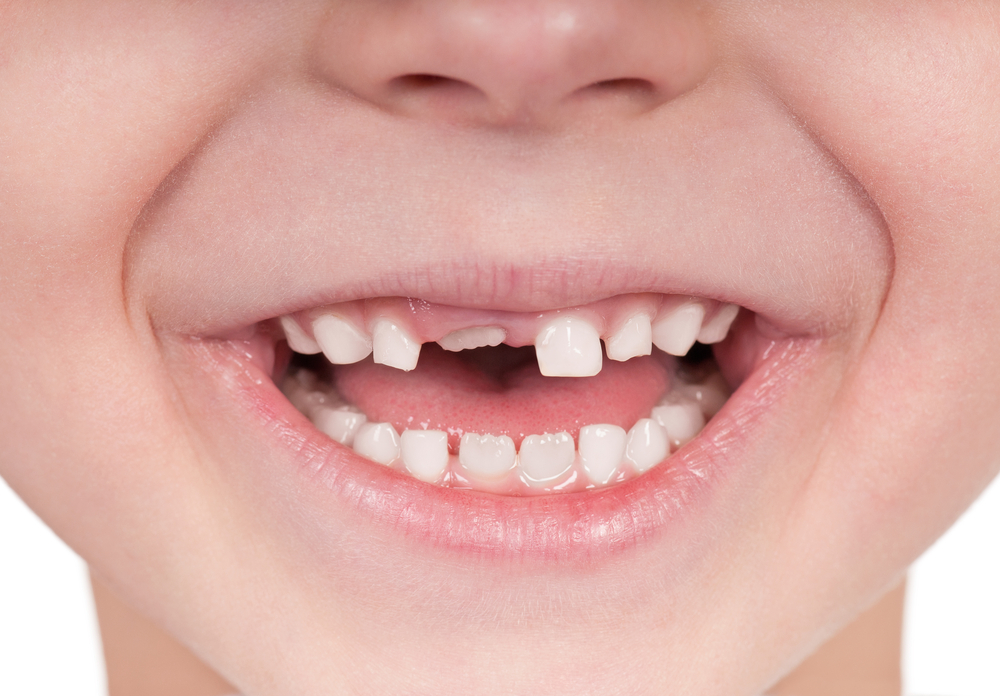Dental Health & Kids: A Guide for Every Age

Oral hygiene and healthy teeth are important at any age, even infancy. Healthy baby teeth guide permanent teeth into place correctly, help properly shape babies’ faces and help kids chew and eat properly and speak clearly. Unhealthy teeth can affect kids’ and babies’ overall health, causing them pain and to have difficulty eating, which can lead to problems in kids’ general development, according to the Washington Dental Service Foundation.
Tooth decay is the most chronic disease of early childhood, according to the Centers for Disease Control and Prevention. It can lead to damage in permanent teeth, resulting in painful and costly treatments.
This guide will help you learn about keeping your kids’ teeth healthy and strong from infancy on and set them up for a lifetime of healthy teeth and good dental hygiene practices.
Teething
Good oral hygiene for babies begins even before teething starts. The American Academy of Family Physicians recommends that soon as he’s born, parents should wipe their baby’s gums with a soft, damp cloth after feeding. This helps prevent bacteria from building up. According to Dr. Margaret Culotta-Norton, a dentist in Washington, D.C., and former president of the D.C. Dental Society, this also helps babies become used to having something in their mouths and eliminates any milk or juice that pools in the mouth. “Pooled milk or juice that sits in an infant’s mouth for a long time can cause the teeth to decay as they erupt,” she told Live Science. “This is called ‘baby bottle tooth decay.’”
According to the National Institutes of Health, your baby should start teething between 6 and 8 months — though some children do not begin to teethe until later. Teething can last for a year or more. Babies should have all their teeth in by 30 months.
Teething is often uncomfortable for babies, but there are several things parents can do to ease their discomfort. The NIH recommends:
- Letting them chew on a cool object, such as a firm rubber teething ring or cold apple (avoid breakable objects and liquid-filled teething rings)
- Rubbing their gums with a cool, wet washcloth
- Feeding them soft, cool food like applesauce and yogurt
- In cases of extreme irritability or discomfort, giving the baby acetaminophen or ibuprofen
- Teething gels may help, but don’t use too much.
There are also some things parents should not do, according to the NIH:
Get the world’s most fascinating discoveries delivered straight to your inbox.
- Do not cut the gums or place alcohol or anything frozen against them.
- Do not give a baby aspirin or place it against the gums.
- Avoid teething powders.
Tooth brushing for kids
“Make brushing fun and part of the daily routine no matter how tired you or your child is,” advises Culotta-Norton. “Good habits are formed early!” How early? Once your baby’s teeth begin to come in, it’s time to start cleaning them. The National Institute for Dental and Craniofacial Research recommends using a small, soft toothbrush or a clean, soft cloth. At age 2 (sometimes earlier, if the dentist suggests), the institute suggests putting a pea-sized amount of fluoride toothpaste on the child’s brush.
The Washington Dental Service Foundation recommends brushing a child’s teeth twice a day for two minutes, paying special attention to the back molars, where cavities tend to develop. Kids will need help brushing until about age 8. To ensure the child learns to brush properly, the U.K. National Health Service suggests guiding the child’s hand during brushing so that he will experience the correct movement. Using a mirror helps kids see where they need to brush.
According to the American Dental Association, parents should begin flossing their child’s teeth as soon as two teeth that touch appear.
Fluoride is an important part of oral care for children and adults, Culotta-Norton said, because it can help protect teeth from cavities. If the drinking water in your area is fluoridated, give your child tap water to drink. Bottled water does not have fluoride.
“If the water is not fluoridated, ask your pediatrician or dentist for a prescription so that your child gets the fluoride they need for strong teeth," she said.
Too much fluoride ingested can cause upset stomachs and white spots on developing teeth. Culotta-Norton recommends using fluoride toothpaste sparingly until the child can spit it out. "However, when the child can spit it out, fluoride toothpaste is very important to keep the teeth strong and it really does prevent cavities,” she said.
First trip to the dentist
The American Academy of Pediatric Dentistry recommends that all children visit the dentist as soon as their first tooth comes in, or by the age of 1. After that, kids should see the dentist every six months, as should adults. Pediatric dentists will explain to the child what is happening, show him the tools, let him sit on a parent's lap during procedures if he is nervous, and provide prizes at the end of the visit.
The first trip to the dentist is called a “well-baby” visit. According to the American Dental Association, during this appointment, the dentist will look for early problems in the child’s teeth and discuss important information about dental hygiene for kids, diet, bottle use and thumb sucking habits. Culotta-Norton also pointed out that this visit establishes a “dental home” for your child.
Baby teeth
Baby teeth are important to a child’s healthy development. Not only do they help kids chew and speak properly, but also they hold space in the jaw for permanent teeth to develop and eventually grow in.
Cavities in baby teeth are among the most common children’s health disorders. Culotta-Norton recommends avoiding or minimizing consumption of foods that are high in sugar and are sticky, such as fruit snacks and fruit rollups, gummy bears and even raisins. “These foods stick in between the child’s back teeth and can cause cavities,” she said. “Make sure you brush and floss the child’s teeth after they eat these sticky foods.”
Another fundamental element in the fight against child cavities is watching what kids drink and how they drink it. Milk, juice, formula and even breast milk contain sugars that can cause tooth decay. Therefore, the National Institute of Dental and Craniofacial Research suggests that parents who like to give their babies a bottle during naptime or bedtime should fill it only with water. Culotta-Norton expanded the recommendation, saying that parents should not let children walk around with bottles in their mouths. The same goes for sippy cups: if a child likes to carry around a sippy cup, keep it filled with water. Try to have the child switch from sippy to open cups around his first birthday.
Usually, children can safely suck their thumbs, pacifiers or fingers until about age 4 with no tooth decay problems, according to the American Academy of Family Physicians. After age 4, tell the dentist if the child still has a sucking habit.
Teeth grinding in children
Medically termed bruxism, teeth grinding and jaw clenching is a common problem for children, affecting at least 20 percent of kids, according to The Bruxism Association. It usually occurs during sleep or when a child is under stress. Episodes last for about four seconds and happen approximately six times per hour during the night.
Kids may grind their teeth for different reasons, including improper alignment of jaws, as a response to pain such as teething, and stress, reported the Nemours Center for Children’s Health Media. Studies have shown that kids that have ADHD, behavioral problems, cerebral palsy, and those taking certain medications are more likely to grind their teeth or clench their jaws.
The Nemours Center recommends that if a child grinds or clenches his teeth, he or she should be taken to the dentist. Grinding teeth often has no adverse effects and most kids grow out of it by adolescence. Nevertheless, it can cause problems and should be treated. Minor problems are:
- Headaches
- Earaches
- Painful chewing
- Sore face or jaw
- Grinding sound annoying other family members
More serious consequences include:
- Worn down tooth enamel
- Chipped teeth
- Increased temperature sensitivity
- Facial pain and jaw problems, such as TMJ or temporomandibular joint disease (although the Nemours Center notes that this is uncommon in children)
To help stop a child from grinding or clenching teeth, the dentist may suggest a mouth guard specially molded to your child’s mouth. If teeth grinding is the result of stress, try talking with the child about his feelings regularly and doing soothing activities before bed.
Common questions about losing baby teeth
How many teeth do children have?
Kids have 20 baby teeth, reported the National Health Service. Adults grow 32 teeth, so eventually a child will grow 32 teeth. This usually happens by the teenage years, though everyone has a different timeline. Sometimes adults have their wisdom teeth removed. If they are all removed, adults have 28 teeth.
When do kids lose their teeth?
According to the Mayo Clinic, kids typically start losing baby teeth around age 6. Girls often start to lose baby teeth before boys. Most kids will have lost all their baby teeth by age 13. Baby teeth usually fall out in the order that they first appeared: two bottom front teeth, two top front teeth, lateral incisors, first/front molars, canines and second/back molars.
How many teeth do kids lose?
Kids will lose 20 teeth — all of their baby teeth — over the course of about seven years.
Additional resources
Jessie Szalay is a contributing writer to FSR Magazine. Prior to writing for Live Science, she was an editor at Living Social. She holds an MFA in nonfiction writing from George Mason University and a bachelor's degree in sociology from Kenyon College.


